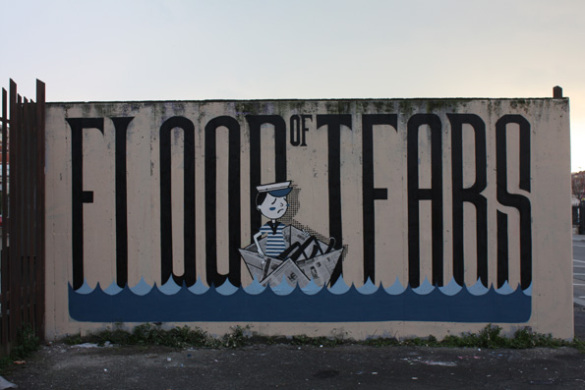Nsw Enquiry, Session 2, Week 4, Day 2 (or: a Flood of Tears)
lewisblayse.net
When the NSW government enquiry into child sexual abuse and its cover-up in the Newcastle-Maitland Catholic church diocese heard evidence from Fr. Fletcher victim, “AH”, a strange thing happened. The assembled public, media representatives, lawyers and enquiry officials flooded the court with their tears. When he had finished his statement (see full transcript below), all media reported that the hearing chamber “erupted in spontaneous applause”. Indeed, as he was about to leave the witness box, Commissioner Cunneen told him that “You must always remember, no shame attaches to you. Your courage has placed the shame squarely where it belongs.” AH did not go into details of the abuse he had suffered, as it was detailed in his mother’s book. What he did go into was the effects the abuse had on him and his family. It was these effects, from an obviously impressive young man, that triggered the tears from those present. The effects were what are becoming recognized as the standard for the victims of these pathetic priests and include alcohol use, relationship breakdowns, depression, business-failure and suicide attempts. As “AH” put it so well, “I actually thought I was just stuffing up my life until I realized I was a typical victim.” It was clear, also, that the cover-ups and uncaring attitude of church officials and their legal advisors provided further suffering for “AH”. The abuser, Fletcher, was sentenced to prison where he died a few years back. That part is closed, but the matter of those who enabled Fletcher to abuse “AH” remains open since no one has yet been held to account for the cover-ups. “AH” himself, has drawn attention to this loose end in his attempts to come to terms with his experiences. He said that his exposure in the media had made his journey even more difficult but he had embraced it so that those responsible for perpetrating and covering up his abuse could be held accountable. “That’s why I’m here today,” he said. He said that he expected that, when he finally got the courage to tell someone about it, the church would not let him down and they would do the right thing. “That wasn’t to be and I believe they put more effort into damage control than into caring for me,” he said. “I thought they’d say yes we know about it. I thought that they’d believe me up front. I didn’t envisage I’d be standing here today, all these years later, with a commission going on.” “AH” then posed a set of rhetorical questions. These were: “If the church had done something about Fletcher years ago instead of moving him around, would he have got to me? “Would I have continued on with my cricket and be playing in the Ashes this year?” (They could do with some help, he joked). “Would I have gone to uni and completed a degree? I tried.” “Would I have had a better or different relationship with my partner?” By contrast, “AH” praised the integrity of police whistle blower Detective Chief Inspector Peter Fox who took his statement. It took 11 months: “I had no idea it would be so hard to get the words out,” he told the enquiry. He spoke of going to the police and of a friend arranging a meeting with a ‘‘good’’ officer, Detective Chief Inspector Peter Fox. “Thank you Peter, thanks,’’ AH said. The enquiry has previously heard that former Bishop, Michael Malone, had responded to police enquiries by tipping off Fletcher he was under investigation, which would have enabled him to cover his tracks and prepare his support. The church also paid for Fletcher’s expensive legal costs, reputed to be $200,000. This author has been critical of the overly legalistic approach of enquiries such as this one (see previous postings). The legal profession will immediately raise the argument that the role of the justice system is to ensure justice reigns supreme, not vengeance. There is, however, a fine line between this laudable aim and forgetting that the really important person in the proceedings is the victim. Last week, we witnessed the ridiculous situation where the enquiry officials warned victims to behave themselves with those accused of covering up for people like Fletcher. We have also witnessed attacks on the integrity of the main whistleblower, Peter Fox. It is time to consider just who the enquiry is really meant to investigate, and who it is meant to help. Much as defence lawyers may wish it, there is no validity in considering a crime in abstract, independent of the effects of that crime on the victim. Stealing $10 from a millionaire is different from stealing $10 from a pensioner. The crime is technically the same, but the effects are very different. In a normal court situation, there is the fall-back on variability of sentencing based on victim impact. This is why sections of the legal fraternity so vigorously opposed the introduction of victim impact statements, in the past. Here, such variation in response is not possible since the enquiry will not itself prosecute anybody who covered-up for the Newcastle-Maitland priests. “AH” is the only victim to give an impact statement to the enquiry to date. The Victorian Parliamentary enquiry has heard many. It took “AH” to remind everyone just what this enquiry is meant to be all about. If the enquiry does not identify the cover-up merchants sufficiently for prosecutions to be launched and have a reasonable chance of success for convictions, then there is no point in it. The last word can be given to “AH”: “They do need to be held accountable.”
|
.
Any original material on these pages is copyright © BishopAccountability.org 2004. Reproduce freely with attribution.
